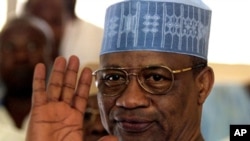A former military ruler in Nigeria is running for president in elections scheduled for next year. The candidacy has revived allegations of corruption during his time in power.
Retired general Ibrahim Babangida says he is running for president because he left so many things behind when he left Abuja, including the value of Nigeria's currency, stable fuel prices, and government reform.
He told reporters this week that he wants to return to the capital to pick up those things for the benefit of ordinary Nigerians.
Babangida is among half a dozen candidates vying for the ruling-party's nomination, but no one has a resume quite like his. A veteran of three successful military coups, Babangida ran Nigeria for eight years, dragging-out a transition to civilian rule by banning all political parties and forcing candidates to run in one of two parties he created.
Political analyst Ignatius Onwuemele recalls when a vote was finally held in 1993, Babangida annulled the results.
"The election that was the freest and the fairest so far in Nigerian history was annulled without offering any reason," he said. "And of course such a man who spearheaded such an annulment is not a democratic individual, as far as I am concerned."
Onwuemele wonders how a man who ruled by decree can work with a multi-party legislature. "As a military ruler, I know that it is not like democracy where issues are tested and tried. He can wake up and take decisions and all that," he said.
Babangida says he takes full responsibility for annulling the June 12, 1993 vote and admits it was a mistake.
Former ruling-party member Edward Oforomeh says Babangida is not the only one to blame. "That June 12th issue is not a personal issue. Although he was the leader of that regime, he could not have done it alone. Babangida could not have done the annulment alone," he said.
As a Nigerian citizen, he says Babangida has every right to run for president. "He did the best he could when he was [in power] and now that he says he is coming back it is left for the populace to decide on whether to vote for him or not," he said.
During his time in power, Babangida created many new local government areas and several new states as part of what he said was a plan to decentralize power.
"Everybody sees today development there as a result of those local governments and states," he said.
Nigeria made huge oil profits with the spike in world prices during the first Gulf War and much of that money collected by the Babangida administration remains unaccounted for. Babangida says he knows that will be an issue in this election, and he is assuring voters that all those funds were properly used to meet government demands at the time.
Warri-based attorney James Jakpor says corruption is a problem for all Nigerians. "The blame of the corruption, the blame of the Naira can not be placed only on Babangida. He contributed his quota, no doubt. But the problem is for the whole of Nigeria," he said.
Political analysts say the former general no longer enjoys such a huge financial advantage over potential rivals. An officer class once dominated by his Middle Belt region is now more geographically and ethnically diverse.
There is also the question of age. Babangida is 68. In a vote to choose a successor to a president who could not complete his term because of a heart condition, many Nigerian voters are looking for a younger, more dynamic candidate.
Nigeria's Former Military Ruler Running for President




